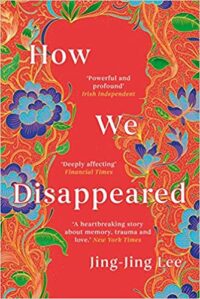Book review: How We Disappeared by Jing-Jing Lee

When a book gets a lot of hype on publication, it can be hit or miss whether I like it. Even a very good book can be spoiled by expectations that are too high. But How We Disappeared by Jing-Jing Lee is one of the cases where I absolutely agree with all the five-star reviews. This novel is excellent.
It’s set in Singapore, with two timelines. In the year 2000 two people are trying to uncover secrets from the Japanese occupation during the Second World War. Wang Di is an old woman who has her own terrible memories of that time. Kevin is a 12-year-old boy desperate to help his father by following up on his grandmother’s deathbed confession.
While both our lead characters have their struggles, the stakes are rather different. As the novel opens, Wang Di’s husband has just died, leaving her alone. She never learned to read, and scrapes a living by collecting scrap to resell for recycling. In her husband’s last days, Wang Di finally told him the story she had hidden for more than 50 years – though he guessed some of it the day they met. But he died before there was time for him to reciprocate – to tell her his own war story. Now Wang Di is filled with regret. And shame, as her neighbours laugh at her and call her names.
“My first day back in town made me feel like I’d entered another country. Out of almost every window hung makeshift Japanese flags cut from white dust cloths. The red and white of the flags, the sound of cloth flapping in the breeze, all of this gave the street the outward appearance of a parade, and it only served to make the unnatural hush seem even sharper, more malevolent.”
Kevin lives a rather nicer life but he is being bullied and his beloved grandmother is dying. Seeing his father’s withdrawal from the world, Kevin decides the solution is to unearth the secret his grandmother hinted at. It’s not easy to unravel, relying largely on the memories of older people – and finding them in the first place.
Wang Di is the heart of this book. Her story is heartwrenching and harrowing. What happened to her is awful and that she survived and found decades-long love is remarkable and wonderful. Her inability to read in some ways keeps her stuck in time, though radio and TV give her some idea of Singapore reckoning with its history. As is perhaps predictable, it is when she is shown kindness at a few key points in the story that I wept.
“As each month passed, the rations diminished…The colour of my skin washed out and turned grey, scaly…Patches of sores, which started out as bug bites and widened into raised welts that refused to go away. Three months. My pelvic bone jutting like the edge of a rock. Half a year. My body kept time and I watched it as if observing a strange life form…This, I thought, this is how we’re going to disappear.”
But Kevin’s presence is important. It’s not just an opportunity to tell another story from the same war, but also shows how Singapore now teaches its youth what happened in that time. Kevin’s compassion and understanding in the face of trauma are beautiful. And his tale also illustrates the stories that were hidden. Generations after the war were negatively affected by their parents’ and grandparents’ memories, often without ever sharing them.
This book’s blurb and most reviews I’ve seen reveal a certain key fact at the centre of this novel, but it’s something I didn’t know going in, and that worked well for me. Though hinted at early on, it isn’t revealed until about a third of the way through, so I’m going to keep it out of this review.
While I absolutely adored this book, as I also found recently with Earthlings, I can only recommend it with content warnings. There are graphic descriptions of war, as well as the violent actions of soldiers towards individuals and whole villages, physical and sexual abuse, plus shame and stigma directed at survivors of abuse and trauma, and quite a lot of death and loss.
But I still loved it.
Published 2019 by Oneworld.
One Comments
Comments are closed.